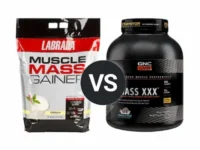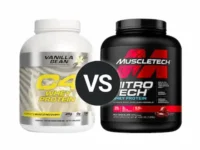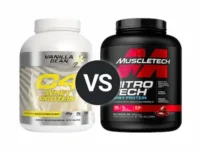Knowledge BaseYou're Questions Answered
Which is best creatine or whey protein?
Creatine and whey protein are both popular supplements, but they serve different purposes. Deciding which is best depends on your specific health and fitness goals, but there is no reason they cannot be used together, and often are. Here’s a breakdown of their benefits and how they compare.
What is Creatine?
Creatine is a naturally occurring compound found in small amounts in certain foods like red meat and fish and produced by the body. It is stored in muscles and used as a quick source of energy during high-intensity, short-duration activities such as weightlifting and sprinting.
Benefits of Creatine
- Increases Muscle Strength and Power: Creatine supplementation can help improve strength, power output, and performance in high-intensity activities1.
- Supports Muscle Growth: Creatine increases muscle hydration and promotes protein synthesis, contributing to muscle hypertrophy over time2.
- Improves Exercise Recovery: Creatine can help reduce muscle damage and inflammation, speeding up recovery between workouts3.
What is Whey Protein?
Whey protein is derived from milk and is a complete protein, meaning it contains all nine essential amino acids. It is rapidly absorbed and is commonly used to support muscle repair, growth, and overall nutrition.
Benefits of Whey Protein
- Promotes Muscle Growth and Recovery: Whey protein provides essential amino acids that support muscle protein synthesis, making it effective for post-workout recovery4.
- Supports Weight Management: The high protein content of whey can increase satiety, potentially reducing overall calorie intake and aiding in weight management5.
- Boosts Immune System: Whey contains immunoglobulins and other bioactive compounds that support immune health6.
Creatine vs. Whey Protein: Which is Best?
- For Muscle Strength and Power: Creatine is more effective for increasing strength and power during high-intensity activities like weightlifting and sprinting7.
- For Muscle Recovery and Growth: Whey protein provides essential amino acids that directly support muscle protein synthesis and is best suited for overall muscle recovery and growth8.
- For Weight Management: Whey protein's satiating effects make it better for weight management, while creatine is not directly linked to weight loss or appetite control5.
Using Creatine and Whey Protein Together
Creatine and whey protein can complement each other when used together. Creatine enhances strength and power, while whey protein supports muscle repair and growth. For best results:
- Take creatine before or after workouts to improve strength and power.
- Consume whey protein post-workout to provide essential amino acids for recovery.
Ultimately, there is no need to choose between the two supplements as they work so well together.
- Kreider, R. B., Kalman, D. S., Antonio, J., Ziegenfuss, T. N., Wildman, R., Collins, R., ... & Lopez, H. L. (2017). International Society of Sports Nutrition position stand: safety and efficacy of creatine supplementation in exercise, sport, and medicine. Journal of the International Society of Sports Nutrition, 14(1), 18.
- Persky, A. M., & Brazeau, G. A. (2001). Clinical pharmacology of the dietary supplement creatine monohydrate. Pharmacological Reviews, 53(2), 161-176.
- Cooper, R., Naclerio, F., Allgrove, J., & Jimenez, A. (2012). Creatine supplementation with specific view to exercise/sports performance: an update. Journal of the International Society of Sports Nutrition, 9(1), 33.
- Phillips, S. M. (2014). A brief review of higher dietary protein diets in weight loss: a focus on athletes. Sports Medicine, 44(S1), S149-S153.
- Leidy, H. J., Clifton, P. M., Astrup, A., Wycherley, T. P., Westerterp-Plantenga, M. S., Luscombe-Marsh, N. D., ... & Mattes, R. D. (2015). The role of protein in weight loss and maintenance. The American Journal of Clinical Nutrition, 101(6), 1320S-1329S.
- Wong, C. W. (2019). Immunomodulatory effects of whey proteins. Nutrients, 11(9), 2237.
- Rawson, E. S., & Venezia, A. C. (2011). Use of creatine in the elderly and evidence for effects on cognitive function in young and old. Aging Health, 7(3), 435-442.
- Kerksick, C., & Smith-Ryan, A. (2020). Nutrient timing: What and when to eat for performance, health, and recovery. International Journal of Sport Nutrition and Exercise Metabolism, 30(6), 485-497.
Related Questions
Related Reviews

Your Answer
We are a participant in the Amazon Services LLC Associates Program, an affiliate advertising program designed to provide a means for us to earn fees by linking to Amazon.com and affiliated sites.



